(Medically reviewed by Dr. Zac Hyde M.D)
Does Intermittent Fasting Increase Testosterone?
Well, that depends, which is why I decided to update this blog post today.
Because the impact on testosterone in men following a time restricted diet can vary depending on your age and fitness levels.
This was demonstrated in a study that was published after this article was written, so it’s important that we take another look at the data.
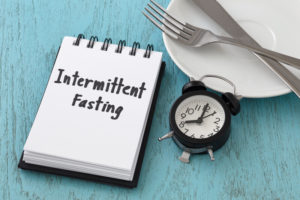
The title of the paper is Effect of Intermittent Fasting on Reproductive Hormone Levels in Females and Males: A Review of Human Trials.
It was published in June of last year by Department of Kinesiology and Nutrition, University of Illinois at Chicago.
And the overall conclusion was this…
In in lean, physically active, young males, intermittent fasting can actually lower testosterone levels.
But that’s not the entire story.
I base this on the huge body of science on body fat levels, fitness and gonad function in aging men.
I also base this on my personal experience with intermittent fasting and the experience of hundreds of my followers.
Because my demographic is older and often unfit men, not lean and young fitness models.
And remember…
When an older guy, with excess body fat and high aromatase activity goes on this diet, very good things happen.
For one, weight loss reduces the aromatase enzyme that converts testosterone into estrogen.
And when this conversion is reduced, testosterone levels climb.
And we have dozens of studies that support this, including this one.
QUOTE:
“The increase in adipose tissue is associated with an increase in the enzyme aromatase that converts testosterone to estradiol leads to diminished testosterone levels that favor the preferential deposition of visceral fat.”
End Quote.
Next…
Intermittent Fasting and Testicle Function
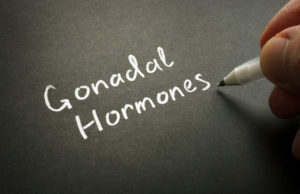
I currently follow a 18/6 intermittent fasting protocol where I start eating at noon and wrap up by 6pm.
And in my case the T-boosting impact of this diet can be found by reaching down and checking my twins.
Because I experience a noticeable increase in size and weight when I’m consistent with this eating pattern.
Which in my opinion is the best way to monitor testosterone to estrogen ratios because daily blood tests aren’t practical.
You can also gauge the success of this diet by monitoring your lifts.
And if your strength and reps continue to go up while your weight goes down…
You can be confident that this diet is creating a more anabolic environment in your system.
Digestion, Inflammation & Testosterone Production
But there’s more…
Gut inflammation reduces hypothalamic and pituitary function, leading to reduced hormone production in men.
According to this paper, chronic gut inflammation predisposes men to hypogonadism and lowers fertility parameters.
Gut inflammation also lower human growth hormone production.
In another paper titled Hallmarks of Testicular Aging the authors concluded with this:
“Collectively, data generated by our group and by other investigators indicate that a key hallmark of the testicular aging process is chronic low-grade inflammation (source).”
And here’s the kicker…
Intermittent fasting drastically lowers gut inflammation, reduces bloating and constipation.
In other words, when you create big gaps between meals, bloating goes down and digestion improves rapidly.
This leads to better gonad function with side dish of more frequent nocturnal erections and increased ejaculation volume.
Which is just another way of saying that fertility parameters go up.
So the punch line here is, if you’re fit, lean and young, you may want to take a pass on intermittent fasting.
But if you’re an older dude who could lose a few pounds, time restricted eating will lean you out and boost your baseline testosterone levels.
And as an extra bonus, it will lower estrogen and improve bedroom performance as well.
Finally…
I’ve executed many protocols in my quest to remain sexually relevant as the years continue to stack up.
And intermittent fasting is one of the most potent weapons in my arsenal.
So if you have poor digestion, excess body fat, high estrogen, low testosterone and undersized testicles.
Eat your first meal of the day around noon, then stop eating by 6pm.
That’s all there is to it.
Does Intermittent Fasting Increase Testosterone Part 2:
Intermittent fasting might be the new Keto diet, which was the new Paleo, which was the new Atkins.
It’s been proven to help with weight loss and body composition, and is in many ways is easier than more “traditional” weight loss techniques.
What’s better, signs show it also impacts testosterone in a few different ways.
Let’s see how.
1. Time Restricted Eating & Testosterone
First off, intermittent fasting may directly increase testosterone production in certain people.
For example…
- We know from dozens of precursor studies that your testosterone levels drop sharply whenever you eat. If you go for several hours without eating, your testosterone production remains high throughout that period.
- A 1989 study looked at hormone production during the Ramadan fast among men. It found their levels of luteinizing hormone (one of the building blocks of testosterone) reached an average of 167% of baseline during the fast (source).
Another interesting fact here: that Ramadan study also found that the subjects’ sensitivity to testosterone increased by 180 percent during the fasting period.
Bottom line: Intermittent fasting may directly increase your testosterone and almost certainly makes your body get more out of the testosterone you produce.
2. Intermittent Fasting Boosts Growth Hormone
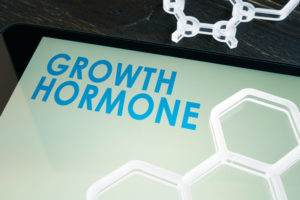
In 1988, researchers at the University of Virginia found that, after 24 hours of not eating, mens’ production of growth hormone increased by a whopping 2000% (source).
Experts think this has to do with what fasting meant to our ancestors.
If they went a day without eating, that meant a state of emergency. The body had to operate at peak performance to catch a meal before true starvation began to set in.
Human growth hormone maximizes performance in the short term, improves body composition in the long term, and benefits mood, focus, and immunity.
It’s also closely linked with testosterone. You don’t get one without the other.
Although the folks at University of Virginia did not test the fact in this study, an increase in growth hormone leads to increased testosterone (and vice versa).
Bottom line: intermittent fasting not only boost testosterone itself, but it also boosts HGH production, which can lead to further increases in testosterone.
3. Intermittent Fasting Lowers Leptin
A 1996 study in Philadelphia was the first of many to discover the relationship between fasting and leptin, finding that serum leptin decreased markedly after fasting, by as much as 80% after 72 hours (source).
The relationship between leptin and testosterone is more complicated and interesting.
Early research with rodents found that increased leptin meant increased testosterone, but when that research moved on to human subjects in the early 2000s, they found the direct opposite: raised leptin levels actually lower testosterone in people.
That’s weird, but not unique to leptin.
This happens because leptin regulates body fat, and in humans more leptin equates to more body fat. And we know from this article, more belly fat leads to increased aromatase, elevated estrogen production and lower testosterone.
Bottom line: lower leptin equals less body fat and more testosterone. Fasting equals lower leptin.
This is also a good place to remind you that intermittent fasting is a strong tactic for shedding body fat in general.
Less body fat also means more testosterone and less circulating estrogen in your system.
4. Fasting Enhances Autophagy
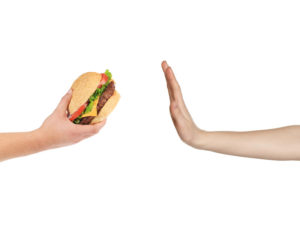
I know what you’re thinking: what the hell is autophagy?
“Autophagy” comes from the Greek, and literally means “self-eating.”
Your healthiest cells find, kill, and eat the damaged, diseased, or dead cells in your body.
They use the pieces for energy, or as raw materials for repair and building new cells. This is a natural process your body does 24 hours a day, 7 days each week.
Autophagy isn’t just important to general health and body function. It’s directly linked to sexual health in men.
For example, researchers can reliably induce erectile dysfunction in animals by blocking autophagy with chemicals and hormones (source).
The same process also directly reduces testosterone in the same subjects (source).
As it turns out, fasting has been demonstrated to stimulate autophagy.
Your body needs a certain amount of calories and raw materials to function each day. If you consume less than that amount, it turns toward its own tissues to get those calories and raw materials.
At the whole-body level, getting them from your stored body fat is how weight loss works.
At the microlevel, autophagy is one way your cells get their fuel and materials when food intake is below what your cells need.
Bottom line: fasting makes your cells eat more of your dead and damaged cells, which in turn improves sexual function and health in general.
Intermittent Fasting: How to Do It
Intermittent fasting works on one level because of how much glucose and glycogen are in your bloodstream at a given time.
If you eat regularly, your body has a steady supply of both, and it taps those supplies of energy when it needs them for activities (including basic maintenance and exercise).
When you fast, your serum glucose and glycogen plummet. When your body needs energy, it has to find it elsewhere.
This explains why fasting works so well for weight loss: it forces your body to gobble up body fat to fuel your activity and workouts.
Simply fasting from time to time can reduce your body fat, and thus boost your testosterone. But you can fine-tune and hack your fasting based on your goals.
If your primary objective is boosting your growth hormone (HGH) production…
Your best bet is to do a cold-turkey 24-hour fast once or twice a week.
I’m not gonna lie, gents, this sucks. It means choosing a day to two each week (I recommend Tuesday or Thursday) and you go about your general life just without eating.
That’s a full 24 hours, for example from 9 pm to 9 pm.
It takes a lot of grit. It’s not fun. For most people, it’s not even sustainable.
But producing lots of human growth hormone requires you to trick your body into thinking it’s about to starve. The benefits outweigh the pain for some, so if you think you’ve got what it takes, give it a try.
If you attempt the 24-hour fast, keep an eye on yourself for dizziness, fatigue, and exacerbation of any health problems you might already have. If these pop up, this method probably isn’t for you. Go with one of the less extreme options below.
If you want high HGH and direct testosterone synthesis…
The superior program for this is called a 16-8 intermittent fast. This is when you eat for eight hours in the day, and fast for the other sixteen.
Research found that subjects who stuck to this diet lost weight and lowered blood pressure even though they ate whatever they wanted during the 8-hour feeding window (source).
Sixteen hours every day seems like a lot of time to go without eating, but keep in mind…
- You’ll include sleep in your fasting period, so you’re only awake and fasting for 8 hours.
- If you consider 10-6 your eating period, that’s pretty close to the standard breakfast-lunch-dinner eating pattern you do anyway. You just skip evening snacking and “nightcap” drinks.
- You still get to drink water, coffee, or other zero-calorie drinks to fill your belly during the fasting time.
This method reduces daily calorie consumption enough to get much of the HGH benefit while also triggering the testosterone stimulation, and it’s much easier than the cold turkey method.
If you’re going for pure weight loss…
You can get good results from either method above, but the easiest plan to stick to for most people is the 5-2 diet.
Like the 16-8 diet, it gets its name from the pattern of eating you’ll use while on it. You eat normally for 5 days each week, then eat only 600 calories of food twice each week.
Don’t get me wrong. Those 600 calories aren’t going to be soda pop, potato chips, and a Big Mac. They’ll be the most nutrient-dense foods you can get your mouth around, foods like:
- Vegetables
- Berries
- Fish or Lean Meat
- Soup and Stews
The key is to eat foods with lots of nutrients per calorie, and with lots of volume per calorie. This combination means you get the biggest bang for your calorie buck while also filling your stomach as much as possible given the restrictions.
Pro tip here: Check Weight Watchers and similar established diet resources for surprisingly delicious recipes that fall within the calorie goals for your fasting days.
As with the 16-8, you’re also allowed to drink zero-calorie beverages all you want on both fasting days.
Intermittent Fasting Tips
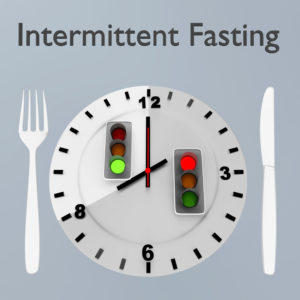
I mentioned earlier about how intermittent fasting is enjoying a bit of popularity this decade.
Because of this, there are plenty of tips, tricks, and best practices to make it work as well as possible for you. Some of the most important include:
Stay busy. I once tried to pass the time during a fast reading paperbacks about a private detective who loves to cook. It was misery. Instead, fill your time with activities that distract you from your hunger.
Realize hunger comes in waves. Your feelings of hunger during a fast will come in intense waves that feel terrible…but those will fade, and you will spend most of your hours relatively comfortable. Don’t panic. Trust that your body will adjust.
Drink plenty of water. Do this for two reasons. First, your body gets most of its needed fluids from food. Less food means you’ll need more water. Second, it keeps your belly full of something so you don’t feel as empty and hungry.
Drink coffee and tea. Another two-reason solution. The fluid fills your belly with a zero-calorie option, which is nice. More important, the caffeine in both beverages is a potent appetite suppressant. You’ll feel less hungry.
Eat plenty of protein when refeeding. Lean proteins are low-calorie, nutrient-rich foods that make your feeding times more efficient. They’re also key to keeping your testosterone production and muscle mass high.
Take it easy on exercise. First of all, you’ll get diminished returns from your workout because you’ll lack the energy to really push yourself. Second, especially early in your fasting, you may produced too much cortisol if you exercise too hard. Don’t skip exercise. But do go light.
Sleep well. Lack of sleep creates a host of problems that make fasting harder and more damaging than it has to be. Also, the hours you sleep are hours of “free” fasting where you’re not aware that you aren’t eating.
Chew sugarless gum. It’s a distraction technique which keeps you chewing…which tricks your body into thinking it has eaten.
Brush your teeth when hunger hits hard. Nobody’s really clear on why this works so well. It’s probably a combination of distracting your mind, giving your mouth something to do, and the taste of mint. But it works. Really well.
Finally, learn the difference between emotional hunger and physical hunger. A lot of what we think of as “hunger” is actually our psychological addiction to the process of eating.
Because your body has several weeks’ worth of reserves, you’ll find most of the “hunger” you feel as you begin to fast is really just emotional food cravings. As you get better at telling the difference, fasting will become much easier for you.
Does Intermittent Fasting Increase Testosterone Conclusion:
One last thing to keep in mind about fasting…
Fasting can be stressful, both emotionally and physically. Stress makes your body produce cortisol, which both increases body fat and directly reduces testosterone production.
If you find your fasting isn’t producing the results you want, dial it back to a less extreme fasting method and eliminate exercising entirely on fasting days.
This will reduce the stress, and improve your hormonal balance. Once you’ve gotten used to the lower-impact fasting, you can ramp things back up again.
